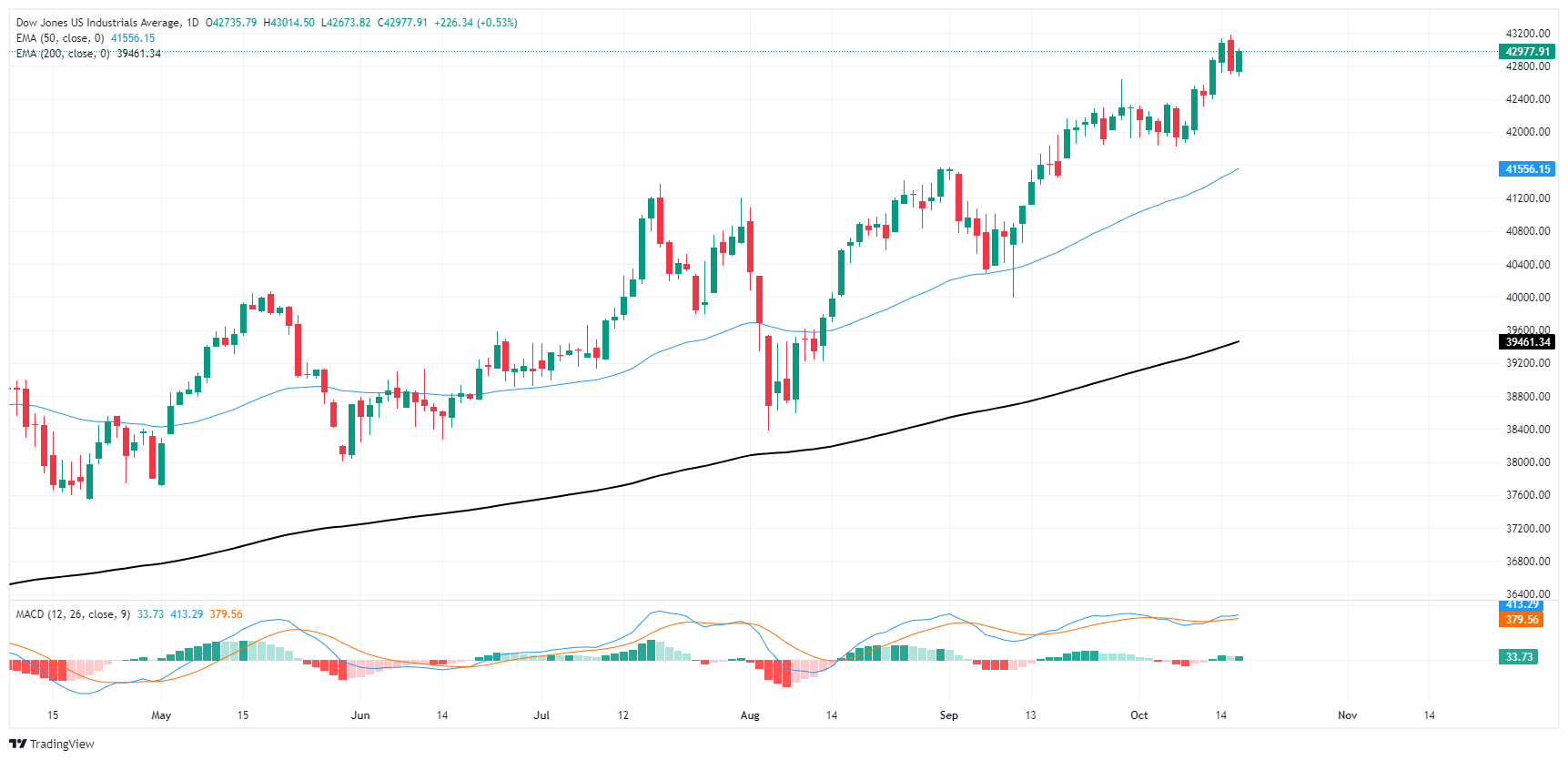- The Dow Jones rose 250 points on Wednesday as the index recovered.
- Equities are rebounding from Tuesday’s declines, with indexes sticking close to record highs.
- The recent ‘Fed frenzy’ has abated, with markets confident of a 25 bps cut in November.
The Dow Jones Industrial Average (DJIA) rallied roughly 250 points on Wednesday as equities pivot around the mid-week inflection point. The Dow Jones is paring away Tuesday’s losses, where the index shed over three-quarters of a percent, keeping price action tight to record highs.
Markets have settled into a holding pattern on Federal Reserve (Fed) rate cuts, with rate traders firmly pricing in 90% odds of a 25 bps rate trim on November 7, with another quarter-point trim firmly priced in for December 18. Investors are exhausted after spending most of 2024 on Fed watch, and Q3 earnings reports have dominated traders’ viewports this week.
The US banking sector posted bumper Q3 earnings this week, dragging multiple indexes to record highs, and a steady stream of warnings about how high interest rates could negatively impact bank profitability has dried up practically overnight. Major players in the tech space, including Amazon (AMZN) and Google (GOOG), are busy inking deals for future nuclear projects. Large-scale companies that deal in data storage and computing farms are looking to provide enough power to server farms being swallowed whole by the amorphous AI sphere.
Costs are rising quickly for the still-budding “AI industry”, a label slapped onto any project that uses large dataset-crunching modeling methods to spit out other recombined, pre-shaped datasets. As energy demand and equivalent power costs soar, the companies selling the shovels in the AI goldrush are looking for ways to deliver cheap, readily available power on a large scale to an industry already grappling with finding value that isn’t direct injections from investors, and future net-positive revenue streams remain elusive.
Dow Jones news
Wednesday is a firm recovery day for the Dow Jones, with two-thirds of the equity index testing into the green. Apple (AAPL) fumbled during the midweek market session, backsliding 1.2% and falling to $231 per share as the tech company took a breather from making recent all-time highs. Intel (INTC) also shed 1.3% to fall below $22.50 per share after it was announced that Qualcomm’s exploratory takeover bid of the chipmaker has been delayed until after the US election in November.
Dow Jones Price forecast
Despite a recent knockback, the Dow Jones continues to test close to record highs. Bullish price action is on pace to take a fresh topside run at the 43,200 level, but intraday bids will first need to firmly recapture the 43,000 handle.
The Dow Jones has climbed over 16% bottom-to-top in 2024, with bullish momentum outrunning the 200-day Exponential Moving Average (EMA) since November of last year. The DJIA has gained nearly 8% in the past two months alone after recovering from a mid-September swing low that pierced the 50-day EMA and tested the 40,000 major price handle.
Dow Jones daily chart
Dow Jones FAQs
The Dow Jones Industrial Average, one of the oldest stock market indices in the world, is compiled of the 30 most traded stocks in the US. The index is price-weighted rather than weighted by capitalization. It is calculated by summing the prices of the constituent stocks and dividing them by a factor, currently 0.152. The index was founded by Charles Dow, who also founded the Wall Street Journal. In later years it has been criticized for not being broadly representative enough because it only tracks 30 conglomerates, unlike broader indices such as the S&P 500.
Many different factors drive the Dow Jones Industrial Average (DJIA). The aggregate performance of the component companies revealed in quarterly company earnings reports is the main one. US and global macroeconomic data also contributes as it impacts on investor sentiment. The level of interest rates, set by the Federal Reserve (Fed), also influences the DJIA as it affects the cost of credit, on which many corporations are heavily reliant. Therefore, inflation can be a major driver as well as other metrics which impact the Fed decisions.
Dow Theory is a method for identifying the primary trend of the stock market developed by Charles Dow. A key step is to compare the direction of the Dow Jones Industrial Average (DJIA) and the Dow Jones Transportation Average (DJTA) and only follow trends where both are moving in the same direction. Volume is a confirmatory criteria. The theory uses elements of peak and trough analysis. Dow’s theory posits three trend phases: accumulation, when smart money starts buying or selling; public participation, when the wider public joins in; and distribution, when the smart money exits.
There are a number of ways to trade the DJIA. One is to use ETFs which allow investors to trade the DJIA as a single security, rather than having to buy shares in all 30 constituent companies. A leading example is the SPDR Dow Jones Industrial Average ETF (DIA). DJIA futures contracts enable traders to speculate on the future value of the index and Options provide the right, but not the obligation, to buy or sell the index at a predetermined price in the future. Mutual funds enable investors to buy a share of a diversified portfolio of DJIA stocks thus providing exposure to the overall index.
























